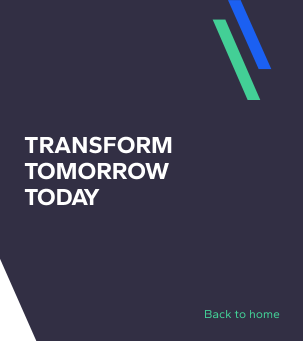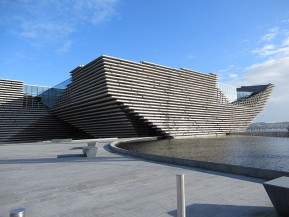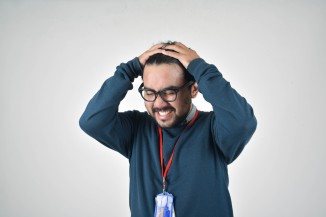
Blog / BIM & Construction Management
Zigurat and its commitment to the SDGs of the 2030 Agenda
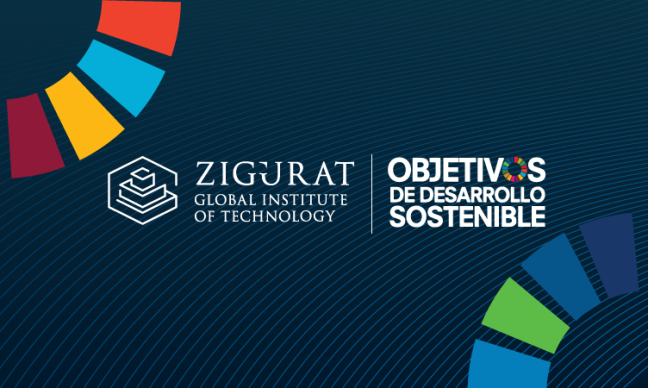
Six years later, and with nine years left in the period established by the 2030 Agenda, the Zigurat Global Institute of Technology would like to share its commitment to the SDGs and explain how it's contributing as an online technological education center.
On September 25, 2015, world leaders adopted a set of worldwide goals to protect planet Earth, eradicate poverty, and guarantee prosperity for all as part of a new Sustainable Development Agenda, the 2030 Agenda. These goals, divided into different targets, require participation from all of us: civil society, private companies, and governments. Below is a description of how Zigurat has been fulfilling its responsibilities toward those objectives where it provides significant contributions:
As an online technological institute with over two decades of experience, part of Zigurat's mission has always been ensuring inclusive and equitable quality education. Since 2001, the institution has focused all its efforts on promoting lifelong learning opportunities for all, adapting to new times and providing an educational offering based essentially on innovation but also on trends and needs in the industry. Devoted to the continuous improvement in education to promote human rights, peace, the responsible exercise of citizenship, health and sustainable development, Zigurat has been focusing its efforts more than ever on skills that champion the best education for all citizens in the world.
With this in mind, Zigurat created a job exchange through which thousands of alumni have been able to steer their careers. This is a service available to the community of alumni with the goal of continuing to benefit them in terms of access to employment. Zigurat is aware that not everyone has the same opportunities in terms of access to education. Its international nature has enabled it to detect realities as complex as this. This is why the institution has a scholarship program for education, to make access easier. The commitment to respond to the most vulnerable profiles with the goal of bringing education closer, always with a global perspective, is continuous.
On the other hand, teacher qualification is one of the skills that Zigurat always advocates, as this is one of the most identifying and distinctive aspects of the school. The educational team is highly qualified and trained when it comes to transferring knowledge about their respective areas. Among other reasons, this is because most teachers involved are experts in their fields and work on their own projects in tandem.
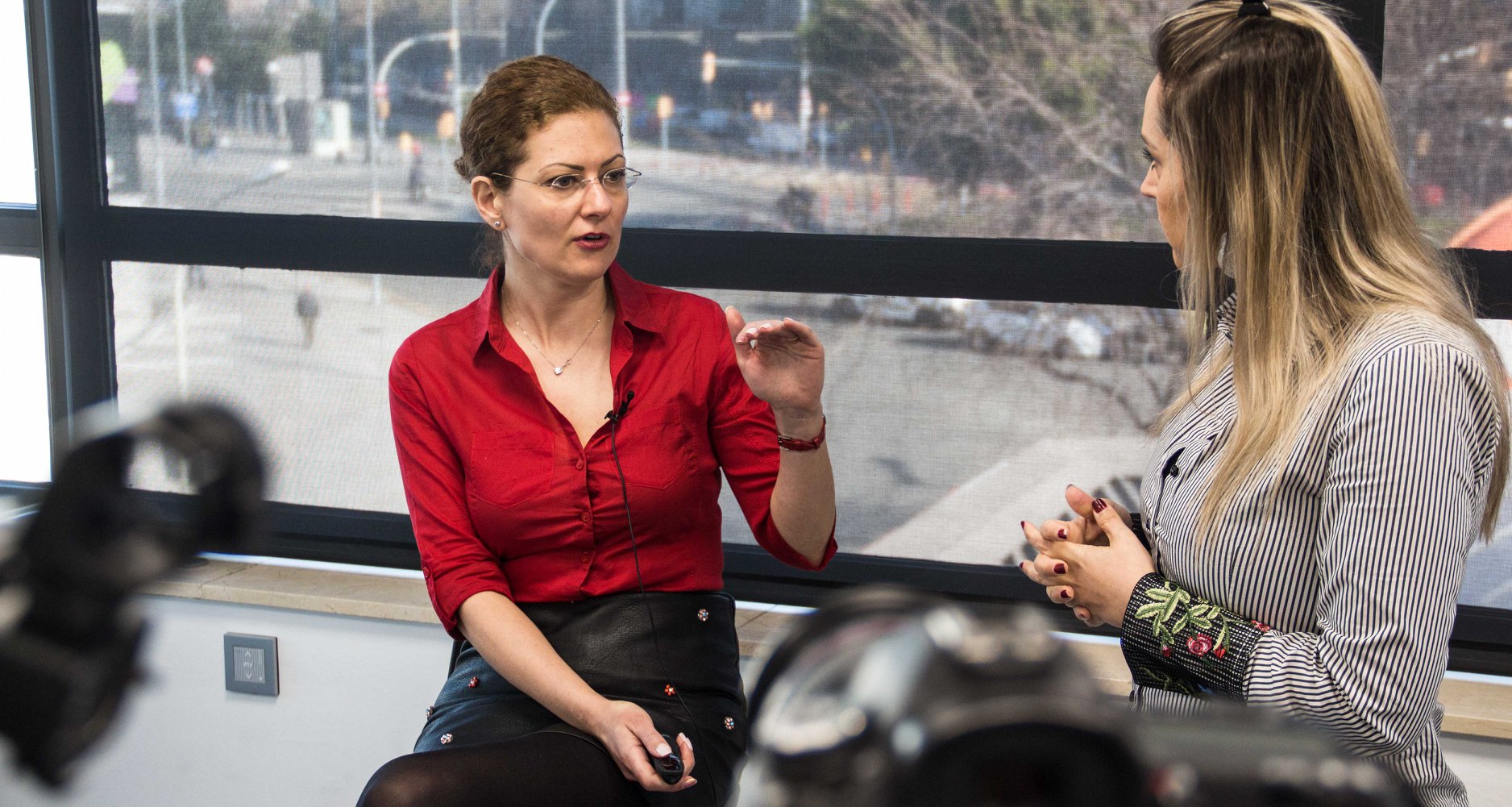
Lilia Stoyanov, professor of the Global MBA in Digital Business The growing number of educational programs aimed at sustainable development represents Zigurat's commitment to global education with awareness of the world and, therefore, responsible towards the environment.
Even though its online nature represents great added value along these lines, the courses and master's degrees focused through this sustainability prism strengthen an education in which the school fully believes:
- Postgraduate Course on Design and Construction with Wood
- Postgraduate Course on Sustainable Construction and Architecture
- International Master's Degree on Smart City Management
- Master’s in Global Smart City Management
- International Master's Degree in Energy-Efficient HVAC, are living examples of this.

Zigurat works enthusiastically to reduce gender disparity in a sector as male-oriented as construction. It does so at every level and along different lines: through its internal team, external collaborations and in terms of teaching. Furthermore, the institution acts as a speaker to raise awareness about female profiles, not only in terms of their presence in the industry but also due to the many merits they continue to accrue year after year.
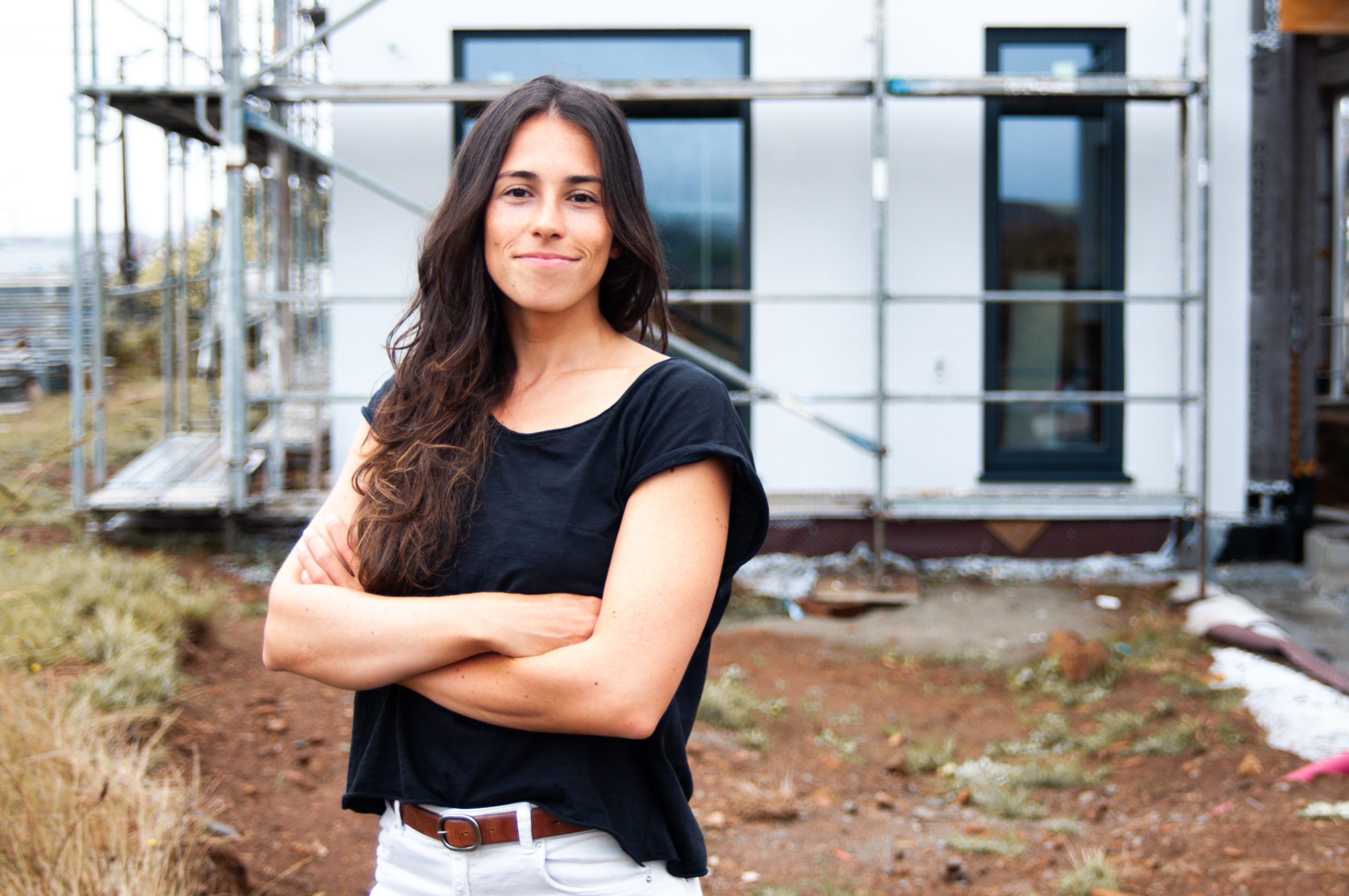
María Sánchez Ontín, professor of the Postgraduate Course on Design and Construction with Wood In this sense, Zigurat is proud to have a team with a noteworthy female presence, as well as to engage in actions and events annually, which are aimed at empowering the concept of women in the construction industry. Likewise, the institution is more committed than ever to supporting the rising dynamics of female participants in educational programs, offering scholarships to groups such as "Women in E&C" or "Women in Business". In these cases, scholarships promote equal responsibility between genders by encouraging the development of skills among female applicants with extensive professional experience.

Energy is one of the largest contributors to climate change, as it represents 60% of greenhouse-gas emissions. Likewise, more efficient energy standards could reduce electricity consumption for buildings and industry by 14%. With these alarming data on the table, Zigurat works with a commitment to providing an educational offering that contributes, more or less directly, to the generation of affordable and non-polluting energy.
The Postgraduate Course on Sustainable Construction and Architecture, the Postgraduate Course on Design and Construction with Wood or the International Master's Degree in Energy-Efficient HVAC are clearly aimed in this direction, promoting sustainable construction based on increasing the share of renewable energy in the energy mix, among many other fronts.
Zigurat's educational programs look directly at new environmentally-friendly construction techniques, not only in terms of construction solutions or integrative designs but also at the level of work methodologies and philosophy.

As an online technology school, innovation is part of our DNA at the Zigurat Global Institute of Technology. In this sense, our commitment to sustainability in the construction industry is part of our natural evolution, always open to responding to the needs that face the industry. The reality represented by this point is complex and multifaceted, because basic infrastructure, such as roads, sanitation or electricity, remains scarce in many developing countries.
Zigurat's educational offering in the field of civil engineering responds to this point effectively, as it is aimed at training focused on the development of reliable, sustainable, resilient and high-quality structures. Furthermore, Zigurat, as a pioneering school in offering BIM online in Spanish around the world, designs these programs guided by the BIM methodology so as to promote the adoption of clean and environmentally conscious technologies and industrial processes and to modernize an industry that demands to be modernized.

Digital twin from a BIM project by Mirela Vladovic, student of the International Master's Degree on BIM Management in Civil Engineering. Taking into account the international outlook that characterizes this school, it offers programs in the area of infrastructures in Spanish, as well as in English and Portuguese.
In this manner, Zigurat ensures that the most important regions in the world are able to adapt, according to their respective capabilities.

Over 3.5 billion people currently live in cities and this figure is expected to rise to 5 billion by the year 2030. It should be noted that 883 million of these live in slums and, since 2016, 90% of people living in cities have been breathing air that does not meet the safety standards set by the WHO (World Health Organization). With the determination of reversing these devastating figures and coping with the many problems arising from them, the Zigurat Institute of Technology has been working tirelessly to deal with these urban realities through education, along different lines. Strictly academically, it should be noted that 2017 saw the birth of the first Smart Cities program at the school, which focuses on new urban models designed from a more respectful and sensible perspective towards citizens and the planet. Today, Zigurat offers the most advanced programs in the field of Smart Cities, in both Spanish and English.
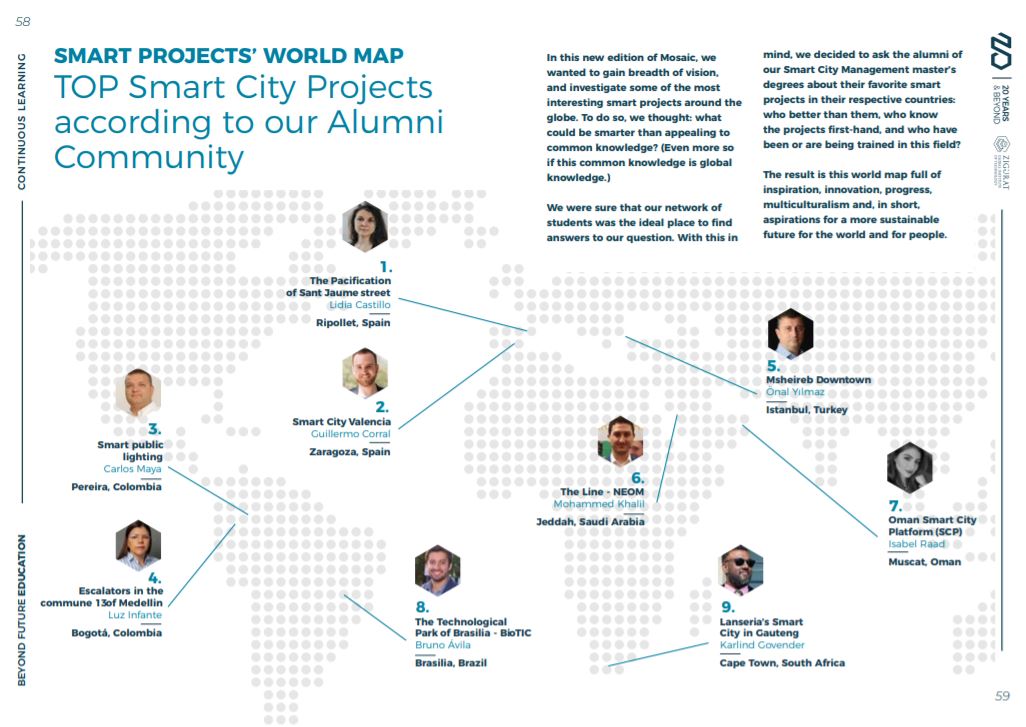
Best smart projects according to the alumni of the Master's Degree in Global Smart City Management. Second issue of the Mosaic Magazine (Alumni Magazine).
The goal lies in contributing in a cross-cutting manner and at the level of knowledge in increasing inclusive and sustainable development in cities. This collaborative and managerial approach is derived directly from the notion of reinforcing capacity for participatory city planning and management, to make cities more integrative and sustainable. At the informational level, Zigurat organizes and participates annually in international events that promote the goals established in this regard. In fact, the school was a pioneer and a visionary behind the "NEXT GEN" concept, which framed the Smart Cities conference cycle held in 2020. This concept has been used by the EU to name the new Recovery Plan to repair the economic and social damage caused by the pandemic.

Climate action doesn't cease to be an objective inherent to some of the above goals. Reality is that the climate promises under the Paris Agreement only cover a third of the emissions reductions necessary to keep global warming under 2°C. Later climate summits held, such as the 2020 COP25 in Madrid, pointed to the fact that little action has been taken during this decade of climate transition. Zigurat supports action. And it supports it through educational programs such as the International Master's Degree in Energy-Efficient HVAC, the International Master's Degree in BIM Calculation and Modeling of Installations or the Postgraduate Course on Sustainable Construction and Architecture.

If we take the road alone, we won't get to the finish line. Zigurat stays firm in the idea of collaborating and cooperating with institutions and organizations that share its values and vision to contribute to a more sustainable world. Encouraging and promoting the establishment of effective partnerships in the public and public-private sectors as well as in civil society, leveraging the experience and strategies to obtain resources from these partnerships, is one of the main roads to achieve these objectives.

Zigurat's Corporate service is based on the exchange of knowledge and on collaboration in terms of education and on promoting and disseminating talent, always towards a common goal: growing as an institution. In other words, Zigurat cooperates to become a more environmentally-friendly company, as do most of its partners. The Lifelong Learning Institute-IL3 of the University of Barcelona, in addition to being one of the school's main academic partners, is also a good example of this type of synergies, based on the 17 sustainable development goals. Through the 17 Sustainable Development Goals set out in the 2030 Agenda, the Zigurat Global Institute of Technology seeks to reflect and express its commitment and complete willingness to establish itself as an online educational institution that advocates sustainable development.

